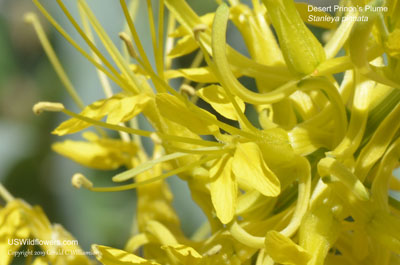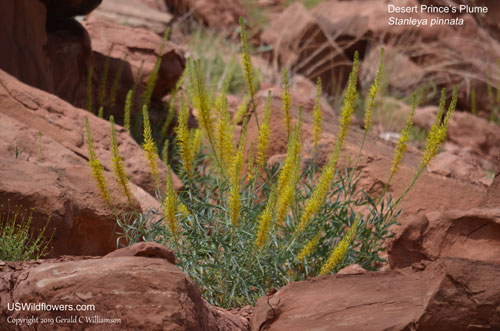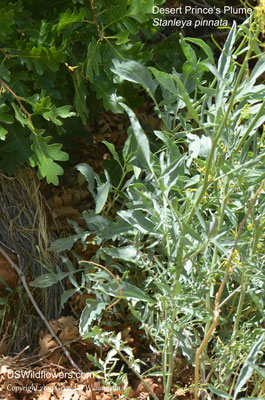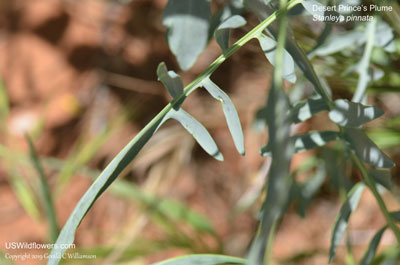Desert Prince's Plume, Golden Prince's Plume, Golden Desert Plume, Sentinel Of The Plains - Stanleya pinnata
|
Stanleya pinnata - Desert Prince's Plume, Golden Prince's Plume, Golden Desert Plume, Sentinel Of The Plains. Stanleya (Prince's Plume) is a small genus of six or seven species of the western United States extending into the western Great Plains. Stanleya pinnata has the largest distribution in the genus, and is the only one found further east than Colorado. Most authorities classify three varieties within Stanleya pinnata, although some authorities consider Stanleya bipinnata to be a variety of Stanleya pinnata rather than a separate species.
Stanleya pinnata is a shrub or subshrub of dry, open habitats ranging from prairies to desert areas. It is the most widely distributed species in the genus.
Found in:
AZ, CA, CO, ID, KS, MT, ND, NE, NM, NV, OR, SD, TX, UT, WY | 
Distribution of Stanleya pinnata in the United States and Canada:

Blue=Native; Grey=Introduced
Map from USDA Plants Database:
USDA, NRCS. 2017. The PLANTS Database (http://plants.usda.gov, 08 May 2025). National Plant Data Team, Greensboro, NC 27401-4901 USA.
Search Our Database: Enter any portion of the Scientific, Common Name, or both.
Do a general Google search of the entire site:
#ad
 Follow USWildflowers on Twitter
#ad
| | Site: Moab, Grand County, UT Date: 2019-April-30 | Photographer: Gerald C Williamson
Nikon D7000 | | The inflorescence of Stanleya pinnata is a raceme of yellow flowers with strongly exserted stamens. Note that the flowers start blooming at the base of the inflorescence, and may be past flowers by the time the flowers at the apex have bloomed. | | 
| | Site: Moab, Grand County, UT Date: 2019-April-30 | Photographer: Gerald C Williamson
Nikon D7000 | | As with all members of Brassicaceae, Stanleya pinnata has four petals and four sepals. All parts are yellow. The sepals are linear to slightly oblong and are spreading to reflexed. The petals are oblong or lanceolate and are clawed. Both the claws and the yellow filaments have hairs at the base; the filaments of Stanleya bipinnata are glabrous. | | Click on the photo for a larger image

| | Site: Moab, Grand County, UT Date: 2019-April-30 | Photographer: Gerald C. Williamson
Nikon D7000
Tamron SP 90MM f/2.8 AF Macro | | Desert Prince's Plume can be a subshrub, shrub, or perennial herb. it grows to about 1 to 4 feet tall. The stems are mostly unbranching. | | Click on the photo for a larger image

| | Site: Moab, Grand County, UT Date: 2019-April-30 | Photographer: Gerald C Williamson
Nikon D7000 | | The leaves of Stanleya pinnata are both basal and cauline, but the basal leaves wither by flowering. The margins are entire, toothed, or pinnately lobed. | | Click on the photo for a larger image

| | Site: Moab, Grand County, UT Date: 2019-April-30 | Photographer: Gerald C Williamson
Nikon D7000 | | The leaves can be deeply pinnately lobed. | | Click on the photo for a larger image

|
References used for identification and information:
|
|
| |
| #ad
|
|







